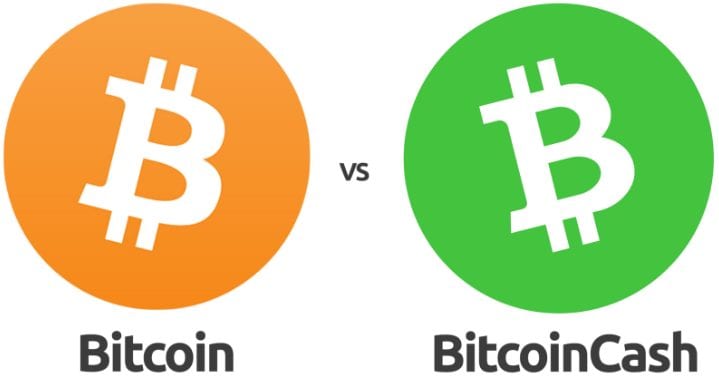
People often confuse the two and here, we will look at the major differences between Bitcoin Vs. Bitcoin Cash.
- Bitcoin Cash emerged from a hard fork of Bitcoin
- Bitcoin Cash vs Bitcoin – advantages of each
- Bitcoin Cash vs Bitcoin – disadvantages of each
- Similarities and differences
Bitcoin – Essence
Bitcoin is the very first cryptocurrency to be created. It also introduced blockchain to the world. Since 2009, when the whitepaper was first released, it has gone through massive rises and falls in price. The cryptocurrency market is well-known for its volatility and this has led to many people making and losing fortunes over the years with Bitcoin.
The aim of Bitcoin is to be the best medium of exchange for the average person, replacing traditional online payment systems which are slow and costly. There are significant costs associated with sending money across borders with banks and the likes due to currency exchange rates and fees associated with them. This is not the case with Bitcoin as they aim to become a global digital currency.

While there have been periods where the Bitcoin network has struggled with scalability issues, as a whole, they have decent fees and processing times for transactions. The network is also completely decentralized which means that no central authority has control over the supply of Bitcoin or changes in the network itself which may not be to the benefit of the majority of token holders. Bitcoin brought blockchain technology to the fore, which is something that is taking over the way the world works. Most industries are now looking at implementing blockchain technology into the way they do things in order to make their processes more efficient and secure. Bitcoin can be sent anonymously which ensures that your privacy can be maintained.
Advantages of Bitcoin
- Peer-to-peer payment network that is borderless. There is no need to deal with foreign exchange fees as is normally seen when using traditional payments systems. It is a global currency that connects everyone together on an even playing field.
- Used as hedge for economic and inflation risks. Recent examples include Venezuela.
- Funds can be sent across the world for minimal costs and have quick processing times.
- Privacy advantage – All payments are encrypted and despite all transactions appearing on the public distributed ledger, there is no way to know who is making or receiving these transactions. Only the wallet address and funds involved in the transaction are included on the ledger. This is why many governments across the world are worried that the likes of Bitcoin will be used for criminal activity, because it is so hard to trace payments.
- Irreversible payments – payments using the Bitcoin network cannot be reversed, once the payment is gone, it is truly gone. This is ideal for merchants who don’t want to be dealing with fraudulent chargebacks by people looking to get free goods and services.
Disadvantages of Bitcoin
The following are some of the cons of Bitcoin that an investor can consider:
- Not widely accepted – very small group of businesses currently accept the coin
- Wallets can be lost – Bitcoin is very easily lost and nothing can be done to recover the lost amounts
- Extreme price fluctuations – Bitcoin went from $20,000 to $5,000 between 2017 and 2019
- No buyer protection – the irreversibility of transactions can be viewed by some buyers as a cons, not an advantage
- Deflation – the total supply of Bitcoin is currently 21m, which automatically means that the currency is built in deflation
- No valuation guarantee – as with all cryptocurrencies, there is no exact or more “fundamental” way to come up with fair value of Bitcoin

Bitcoin Cash – Essence
While Bitcoin was the original cryptocurrency and set out the guiding principles for many future tokens, Bitcoin Cash is an offshoot of this network. It was in August of 2017 that there was a hard fork in the Bitcoin Network that led to the creation of Bitcoin Cash. This came at a time when the transaction costs and processing times on the Bitcoin network were getting out of hand due to network congestion. There was a split in the community, with many believing that Bitcoin was straying away from its original driving principles. The consensus among Bitcoin miners who wanted to improve the fluidity and speed of the Bitcoin network were also skeptical about the adoption of the so called SegWit2x.
When the issues were not looking like being solved, the hard fork took place. After its creation, Bitcoin Cash managed to bring back the low costs and increase processing times. Many even believed that this was the true Bitcoin and the market position should be flipped with Bitcoin in order to showcase this.
The major difference between Bitcoin Cash and Bitcoin was the block size. Bitcoin’s block size is 1MB, while Bitcoin Cash’ – 8MB. This meant that a lot more transactions could be processed per second and there would be little to no network congestion. Scalability has always been the core issue with Bitcoin, but a simple change in the size of the block could have reaped a lot of relief for this congestion, but this was something which ultimately was not approved.
Advantages of Bitcoin Cash
- High efficiency – more transactions are validated on the larger block size
- Safe against possible wipeouts
- Great exposure to the largest crypto exchanges
- High liqudity
Disadvantages of Bitcoin Cash
- Investor faith is low – Bitcoin is still the number one cryptocurrency and investors have found it difficult to switch their faith to Bitcoin Cash, a trend that is expected to continue to prevail in the future
- Low adoption levels
- Dealing with a huge competitor – Bitcoin Cash is undeniably in the shadow of its “parent” and the perception will likely go on in the near future
Bitcoin vs. Bitcoin Cash
Bitcoin and Bitcoin Cash have many similarities, since Bitcoin Cash originated from Bitcoin. They both are great mediums of exchange for cross border payments as they take currency risks out of the equation. They are both secure and transparent platforms which keep party’s data safe when making transactions. They are both decentralized meaning that no central authority is able to control the respective tokens.
The main differing factor between the two currencies is the scalability issues Bitcoin struggles with. This is desirously detrimental and Bitcoin Cash probably wouldn’t exist today if it wasn’t for this issue. It seems that a simple change in the max size of Bitcoin network blocks would solve a lot of issues, but this is something that doesn’t look like happening. This allows Bitcoin Cash to continue undercutting Bitcoin in the form of lower transaction fees and quicker processing times. For now, however, Bitcoin still dominates the crypto “food” chain and this is not likely to change any time soon.
Conclusion
Both Bitcoin and Bitcoin Cash are very useful mediums of exchange for the average person. As Bitcoin Cash originated from Bitcoin, they are both extremely similar. If you are looking for fast and cheap payments, Bitcoin Cash in its current form is probably the best option for you. If you don’t mind sacrificing some time and speed for better liquidity, then you might be better served with using Bitcoin.
It is certainly going to be exciting to see how both of these digital currencies evolve and perform over time into the future. If you are looking to use either of these cryptocurrencies or make an investment, make sure that you are using the best crypto brokers and crypto trading strategies as outlined in the crypto broker comparison guide. Therefore, you are giving yourself the best chance as possible to benefit from your investment.
The other factor that needs to be considered is the regulatory aspect, especially when it comes to Bitcoin. Governments around the world are struggling to come up with a uniform regulatory framework that establishes the ground rules for regulating Bitcoin. Should it become regulated, there can be a massive change in its market cap as well as the perception it receives from investors.
PEOPLE WHO READ THIS ALSO VIEWED:




